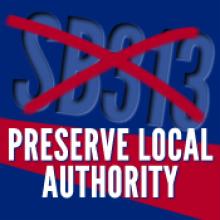Honesty From Heartland: Munis Outgunned in Competition with Private Sector
The Heartland Institute is one of those organizations that will say anything its massive corporate funders want it to. It is embroiled in a scandal from the release of internal documents due to its work challenging the science behind climate change.
In the telecom space, Heartland's employees have encouraged laws to take decision-making authority away from communities in order to benefit the massive cable and DSL companies (like Heartland-funder AT&T).
They advocate for efforts like Georgia's SB 313 and South Carolina's H3508, saying:
- Muni networks are doomed to failure because of the general incompetence of government
- Muni networks will drive private sector providers out of the market because governments are too all powerful and have too many advantages in competition
A municipal government cannot possibly hope to compete with well-capitalized broadband providers in a highly competitive market.For those unfamiliar with Heartland, they don't use the same definitions for common words like "competitive" as the rest of us do. In Heartland's world, "competitive" means a market in which one of our funders operates regardless of how much competition exists in it. So why do we need new legislation to make it even harder for communities to build the networks that the cable and DSL companies won't build?



